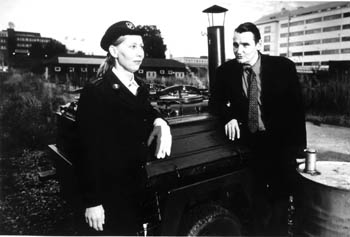![[Metroactive Movies]](/movies/gifs/movies468.gif)
[ Movies Index | Show Times | Silicon Valley | Metroactive Home | Archives ]

Photograph by Marja-Leena Hukkanen Salvation Seeker: A nameless man (played by Markku Peltola) finds romance with a Finnish Salvation Army officer (Kati Outinen) in 'The Man Without a Past.' Helsinki's Half Acre 'The Man Without a Past' offers a natural nostalgia without wallowing NOT MANY people could be immune to the dry charm of The Man Without a Past, the big noise at Cannes last year. Aki Kaurismäki's film wells up with a natural humanism. Writing about the Czech import Divided We Fall, I remembered Saul Bellow's quote "Man has only two choices: brotherhood or crime." And that isn't good news: if we don't choose a life of crime, we choose a life of work and sharing, two things few people enjoy. But this Finnish export bears an attractive idea: a man become a blank slate by amnesia naturally gravitates toward kindness and unselfishness on his own. A traveler (Markku Peltola) arrives in Helsinki: a nameless, middle-aged man with a face that looks carved out of a raw potato. He's trusting enough to think he can sleep in the park. Three huge thugs rob him and kick him nearly to death in his sleep. In the hospital, he's declared dead. But he snaps out of it, rising from under the sheet that covers his head. He wanders toward the harbor, where he finds a family straight away. They feed him and put him up for the night. They're squatting in a railway cargo container on the water's edge, waiting for a place in public housing. The man of the house, Nieminen (Juhani Niemelä) works as a night watchman; Mrs. Nieminin (Kaija Pakarinen) keeps her husband on the straight and narrow. The two of them land the nameless man a spot in another railway container, and he starts to make a life. These scenes of settling down keep you grinning. The man sweeps up, gets the place cozy and pays his rent to the big bluffer of a security guard, Anttila (Sakari Kuosmanen). The amnesia plot may sound like the forgotten Harrison Ford film Regarding Harry, in which the hero becomes a better man after a crime robs him of his memory. Mike Nichols' film also kept cutting to the loyal pet dog. The Man Without a Past is a movie in which no one smiles for the first half, until a smiling dog enters the picture: Hannibal, the uninclined junkyard dog accompanying the security guard on his rounds. "Kill," orders his master. The dog smiles and pants. Still, Kaurismäki's "gentleness and nonchalance"--as critic Jean-Sebastiaen Chauvin put it--keeps this film uncontrived. As these squatters mull around the harbor yard, it's like a solemn version of Steinbeck's Cannery Row, maybe because of the blue of the water, as blue as the sea at Monterey. The dialogue is rich with comic understatement, and the film achieves nostalgia without reaching for it. As in so many postmodern films, the clock seems to have stopped in 1975. The colors--the dark ultramarine of the sea, the crimson red of stage blood, a mild turquoise for the humid sky--look pleasingly like an old postcard. But the varied patches of rust on the sheds, the slow-healing black bruises on the man--these are also part of the palette. Sure, the man is poor, but it's his destiny to bring love to a plain but worthy major in the Pelastus Armeijan, the Finnish Salvation Army. The officer, Irma (the funny and touching Kati Outinen, who won best actress at Cannes 2002), is an unmarried woman who, like most of the cast, exists in an advanced state of Scandinavian shock. But she responds to something in this morose squatter. Kaurismäki is a prolific, unpredictable director. He made a rock-movie parody in his film about the imaginary Russian rock band the Leningrad Cowboys. He's also tackled more classic themes: both a contemporary Crime and Punishment and a business-suited Hamlet that anticipated the Ethan Hawke version. In commenting on this new film, he notes hopefully that The Man Without a Past has "commercial values." Maybe the danger is that the movie is so openly good-natured that it could be a source for a Robin Williams remake. What saves it from being too-cute is Kaurismäki's natural way with romantic poverty. Not everyone has a feel for it--Jean Vigo and Jean Renoir in their day, the Coen brothers in ours. So, The Man Without a Past is the first perfect film of the New Depression. In hard times like these, people need movies that make them feel like they'll get through to the other side, that good friends as well as an independent, enterprising personality will save them from the worst of poverty. Any kind of poor-person film risks being like one of Chaplin's Little Tramp adventures in his direr moments, a story of a lonely individual battered: "'Love me,' he [Chaplin] has asked from the beginning," critic Robert Warshow noted. "Love me. And we have, apparently, loved him, though with such undercurrents of revulsion as might be in response to so naked a demand." (That's a good description of Williams at his worst, too.) Peltola and Outinen are all the more lovable for not asking to be loved, and The Man Without a Past's ashcan lyricism is the right mixture of sugar and salt.
The Man Without a Past (Unrated; 97 min.), directed and written by Aki Kaurismäki, photographed by Timo Salminen and starring Markku Peltola, opens Friday at the Towne in San Jose and the Aquarius in Palo Alto.
Send a letter to the editor about this story to letters@metronews.com. [ Silicon Valley | Metroactive Home | Archives ]
|
From the April 24-30, 2003 issue of Metro, Silicon Valley's Weekly Newspaper.
Copyright © Metro Publishing Inc. Metroactive is affiliated with the Boulevards Network.
For more information about the San Jose/Silicon Valley area, visit sanjose.com.